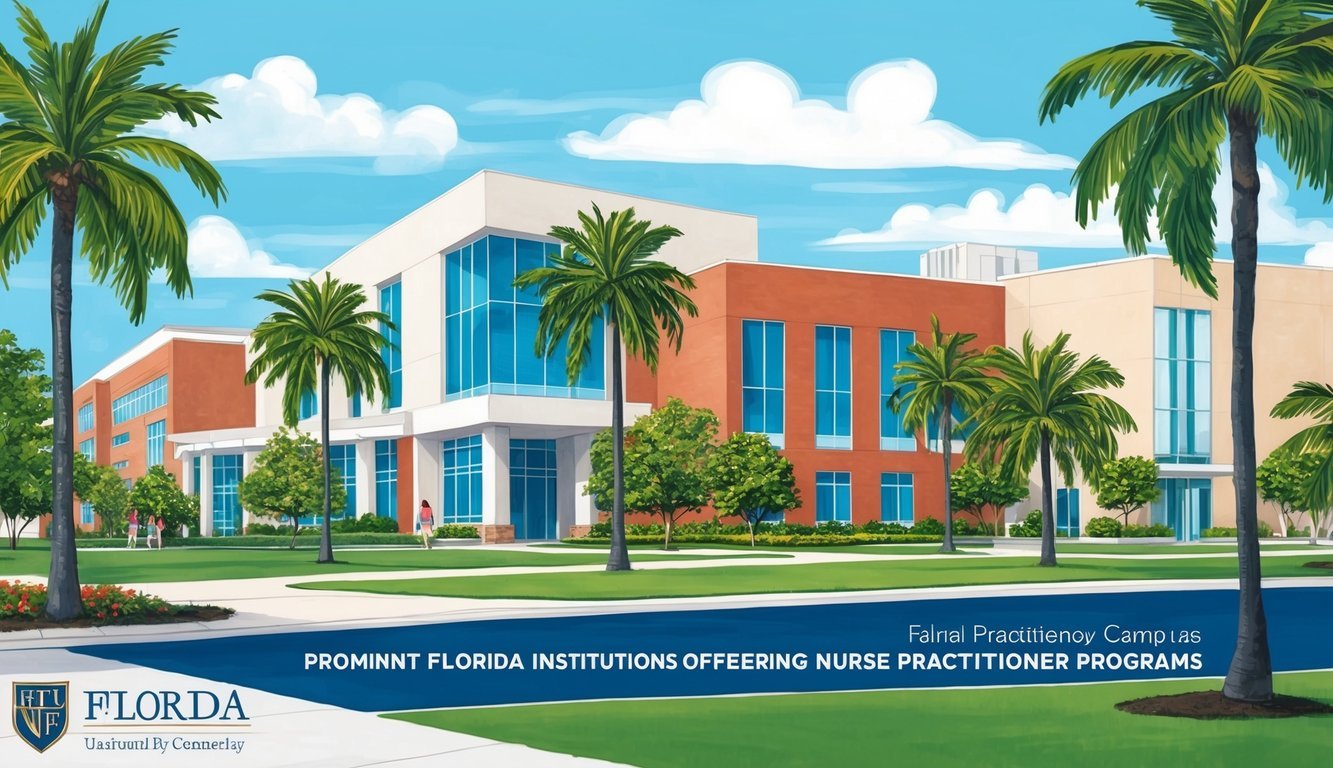Nurse practitioner programs in Florida offer a crucial pathway for registered nurses looking to advance their careers in healthcare.
These programs equip you with the skills needed for primary care practice.
Whether you are interested in a traditional Doctor of Nursing Practice (DNP) or an accelerated program, Florida’s institutions provide a range of specializations to suit your professional goals.
As you explore the landscape of nurse practitioner programs in Florida, you’ll find key factors such as admission requirements, curriculum structure, and career opportunities.
Programs like the Family Nurse Practitioner at the University of Florida or the FNP DNP program at UCF are designed to foster your growth in the nursing field.
Not only do these programs focus on clinical competencies, but they also emphasize health promotion and management of various health issues.
By considering a nurse practitioner program in Florida, you are positioning yourself for a rewarding career that addresses the growing demand for healthcare providers.
With a commitment to quality education and practical training, you can make a significant impact on patient care in your community.
Explore the top programs and find the right fit for your aspirations.
Overview of Nurse Practitioner Programs in Florida

Nurse practitioner programs in Florida provide essential pathways for advanced nursing careers.
These programs are designed to meet both the educational and certification requirements necessary for practicing as a nurse practitioner in the state.
Accreditation and Certification
Accreditation is crucial when selecting a nurse practitioner program.
In Florida, programs must be accredited by recognized bodies such as the Commission on Collegiate Nursing Education (CCNE) or the Accreditation Commission for Education in Nursing (ACEN).
To practice as a nurse practitioner, you must also attain national certification.
This certification is typically obtained through organizations like the American Nurses Credentialing Center (ANCC) or the American Academy of Nurse Practitioners.
These certifications validate your skills and improve your job prospects significantly.
Program Types: BSN to DNP and MSN
In Florida, you have several options for advancing your nursing education, including the BSN to DNP program and the Master of Science in Nursing (MSN).
The BSN to DNP program allows registered nurses with a Bachelor of Science in Nursing to pursue a terminal degree in nursing.
This program focuses on both clinical practice and leadership skills, preparing graduates for high-level roles.
On the other hand, the MSN program is tailored for those who may already hold a master’s degree in nursing.
Its focus is primarily on specialized training in areas such as family practice, pediatrics, or acute care.
Both types of programs equip you with the necessary skills to succeed in various healthcare settings and contribute effectively to patient care.
Specializations and Curriculum

Nurse practitioner programs in Florida provide various specializations to equip you with essential skills for advanced practice.
Each specialization focuses on specific aspects of patient care, emphasizing clinical hours and practical application of nursing education.
Family Nurse Practitioner Track
The Family Nurse Practitioner (FNP) track emphasizes providing comprehensive healthcare across all age groups.
In this program, you will engage in extensive coursework that integrates principles of patient assessment, diagnosis, and management.
Key areas of focus include:
- Clinical Hours: Typically, you will complete between 600 to 1,000 clinical hours to gain hands-on experience.
- Curriculum Components: Courses may cover advanced pharmacology, pathophysiology, and health promotion strategies.
- Patient Care Skills: You’ll learn to manage chronic illnesses, perform physical exams, and develop treatment plans tailored to individual needs.
This track prepares you to serve as a primary care provider in diverse settings, ensuring holistic approaches to health.
Advanced Practice Nursing Roles
In Florida, the curriculum for advanced practice nursing roles is designed to prepare you for leadership and specialized functions.
You will study various topics that enhance your capability in managing complex patient cases and healthcare systems.
Critical elements include:
- Diagnosis and Management: In-depth training on diagnosing diseases and managing healthcare strategies.
- Interdisciplinary Collaboration: Emphasis on working alongside other healthcare professionals to ensure quality patient care.
- Regulations and Ethics: Courses will address the regulatory frameworks guiding advanced practice nursing.
These components ensure you are well-equipped for the evolving demands of healthcare environments.
For more on advanced practice nursing, check resources like Nursing Process.
Admission Requirements and Process

When considering nurse practitioner programs in Florida, it’s essential to understand the specific admission criteria and processes required by various universities.
These criteria can vary significantly, particularly for those pursuing a post-master’s certificate.
University-Specific Criteria
Each nursing program in Florida has its own set of admission requirements.
For example, the University of Florida requires applicants to hold a Bachelor of Science in Nursing (BSN) and be a licensed registered nurse.
Your GPA should typically be at least 3.0 on a 4.0 scale.
In addition, you may need to provide letters of recommendation, a personal statement, and evidence of relevant clinical experience.
Some programs, like those at the University of North Florida, set strict grading standards; you cannot earn more than two grades lower than a B during your coursework.
Post-Master’s Certificate Options
For individuals with advanced nursing degrees, many programs offer a post-master’s certificate to further qualify for nurse practitioner roles.
Admission to these programs usually requires you to hold a master’s degree in nursing and have current RN licensure.
You’ll likely submit your transcripts, proof of your nursing license, and additional documentation showcasing your experience in advanced clinical practices.
Specific programs may also require a personal interview or additional standardized testing.
This pathway allows you to specialize in areas such as family nursing or acute care, enhancing your career opportunities.
Key Florida Institutions Offering NP Programs

Florida boasts several reputable institutions offering Nurse Practitioner (NP) programs, ensuring that aspiring nurses have ample opportunities for education and specialization.
The following highlights key universities that stand out for their comprehensive offerings and quality education.
University of Central Florida
The University of Central Florida (UCF) provides a robust NP program focusing on advanced practice nursing.
UCF offers both Master’s and Doctor of Nursing Practice (DNP) tracks.
Key features include:
- Specializations: Family Nurse Practitioner, Adult Gerontology Primary Care Nurse Practitioner.
- Format: Primarily online with clinical placements in the community.
- Accreditation: Programs accredited by the Commission on Collegiate Nursing Education (CCNE).
UCF’s NP program emphasizes evidence-based practice and prepares you to provide high-quality healthcare.
For more details, visit UCF Nursing.
University of Miami
At the University of Miami, the NP program is known for its rigorous curriculum and innovative simulation labs.
The university offers several concentrations, including:
- Specializations: Pediatric Nurse Practitioner, Psychiatric Mental Health Nurse Practitioner.
- Clinical Experience: Extensive clinical rotation opportunities within diverse healthcare settings.
The program is tailored for students who wish to integrate research and practice effectively.
The faculty consists of experienced professionals dedicated to mentoring students throughout their educational journey.
For further information, explore University of Miami Nursing.
Florida Atlantic University
Florida Atlantic University (FAU) is another prominent institution offering NP programs that are designed to meet the evolving needs of healthcare.
The primary offerings include:
- Tracks Available: Family Nurse Practitioner, Adult Gerontology Nurse Practitioner.
- Delivery Method: Online classes complemented by hands-on clinical experiences.
FAU’s programs focus on developing leadership skills and clinical expertise.
The university also prioritizes community health, ensuring that graduates are equipped to address complex health issues.
For more information, check out Florida Atlantic University Nursing.
These institutions exemplify Florida’s commitment to producing highly skilled Nurse Practitioners ready to meet today’s healthcare challenges.
Career Outcomes and Resources

Understanding career outcomes and accessing relevant resources is crucial for your success as a nurse practitioner in Florida.
This path offers various career opportunities, supported by organizations and governing bodies that provide essential tools and networks.
Florida Board of Nursing Resources
The Florida Board of Nursing is pivotal for nurse practitioners operating in the state.
They regulate the practice and education of nursing professionals, ensuring adherence to standards that safeguard public health and safety.
Key resources include:
- Licensure Information: Guidance on applying for and renewing your nursing license.
- Continuing Education Requirements: Information on required training to maintain your license.
- Complaint Process: Procedures for filing complaints or reporting misconduct.
The Board’s website provides essential updates on practice regulations and oversees compliance, making it vital for your professional development.
Professional Organizations and Network
Engaging with professional organizations enhances your career and provides networking opportunities.
Two significant entities are:
-
American Nurses Credentialing Center (ANCC): This organization offers certification programs that validate your specialty knowledge. These programs improve your employability and professional credibility.
-
American Association of Nurse Practitioners (AANP): This association advocates for nurse practitioners. It also provides educational resources, policy updates, and networking opportunities.
Local groups like the Florida Nurse Practitioners also play a vital role in supporting state-specific interests.
Membership in these organizations often yields benefits such as access to conferences, job boards, and professional development resources.
By connecting with these networks, you enhance leadership skills.
You also stay informed about health policy changes affecting your practice.

